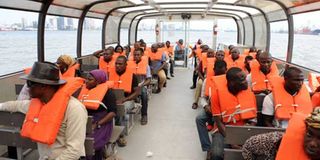In some ways, Nigeria is like Kenya, but in others, it’s simply years ahead

Passengers sit in a ferry at the Marina station in Lagos on November 28, 2012. More than a million Lagosians now use ferry service yearly as an alternative means of transportation to overcome the chaotic traffic challenges on Lagos roads. AFP FILE PHOTO | PIUS UTOMI EKPEI
What you need to know:
- Fashola talks much like a president would, though he is a governor; about how a greening project that his government started has created 97,000 jobs.
- He looked at the traffic congestion in Lagos, and thought the city needed a cable car that is hoisted in the air and not prisoner to the road, so he built and is about to complete one.
- He sank money into ferries and piers and water transport, and today three million residents of Lagos travel by water to and from work.
We just organised a breakfast discussion in Lagos, Nigeria’s commercial capital, where Governor Babatunde Raji Fashola — the equivalent of Nairobi’s Evans Kidero — was the keynote speaker.
In Kenya, there has been an acrimonious debate about governors. I think Parliament was trying to pass a Bill to ban them from flying national flags on their four-wheel drives, and now the Senate is trying to take away — or at least reduce — their power over county development budgets.
If Kenyan governors saw Babatunde (and presumably other Nigerian governors) they would kill themselves. Of course he flies a flag.
However, not even Kenya’s President Kenyatta would have arrived in the type of convoy that Fashola did. So at the level of comparisons, the Kenyan governor is a village chief.
However, not only does Fashola have a more glamorous and expensive convoy, and any number of those muscular men with dark glasses and earpieces around him, than Kenyatta, he also runs an economy that is nearly three times bigger than all of Kenya’s.
As someone put it, Lagos State alone is Africa’s fourth biggest economy after South Africa, Egypt, and Algeria.
Fashola himself is a popular governor, not only because he delivers and has been revolutionary in remaking Lagos, but also because despite the power he has and the wealth he oversees, he is quite humble.
Which leads us to the next issue. On Sunday when you go to church, you might hear the priest or pastor denouncing wealth and power. Don’t take them seriously, and don’t tell your children the same thing. Money and power are good.
The only people who are embarrassed about money and humble in the exercise of power, like Fashola, are those who have it.
But it is in hearing him talk that you realise that Lagos — and indeed Nigeria — are not ordinary places.
Fashola talks much like a president would, though he is a governor; about how a greening project that his government started has created 97,000 jobs.
NO ONE SUED HIM
He tells of how his government over the last six months has been building 200 apartments every month for Lagos residents. Their costs are controlled to make them affordable.
To avoid corruption, those interested apply online, where a mortgage calculator tells you how much you have to pay, and so on. Essentially an algorithm decides who gets the apartments, as one way of cutting out corruption and speculators.
The system has weeded out speculators so well, in some months they have had fewer successful applicants than there are apartments.
Fashola is a numbers man, and he has the figures. The construction related to the Lagos State apartments has created 50,000 jobs, he says.
He is pouring money into schools — and in a feat that even a Cabinet Secretary in Kenya might not pull, he had the clout to cancel an increase in the number of university students in his state… and no one sued him.
He looked at the traffic congestion in Lagos, and thought the city needed a cable car that is hoisted in the air and not prisoner to the road, so he built and is about to complete one.
TRAVEL BY WATER
In 2006, about 100,000 people used boats to travel to work in Lagos from its three main islands. Today, they use the bridges, the longest network in Africa.
So what did he do? He sank money into ferries and piers and water transport, and today three million residents of Lagos travel by water to and from work.
The thing about all this, for someone who comes from a part of Africa where people go to war over contracts for such projects, the man talks about these things so casually as if it was about one-shilling change in the supermarket.
Then someone asked him why some companies, like chocolate drink maker Cadbury, were moving their manufacturing to other Nigerian states (not to other countries).
His answer would blow the socks off most East Africans. He said the Lagos economy was “changing” (what he meant was that it was getting more sophisticated) and it needed services more than manufacturing. In short, the polluting industries belong to the countryside, not Lagos City. Not many African presidents could afford to say that.
Fascinating things are happening on this continent. If you can, travel and see them before you die.
Mr Onyango-Obbo is editor of the Nairobi-headquartered Mail & Guardian Africa (mgafrica.com). Twitter@cobbo3





